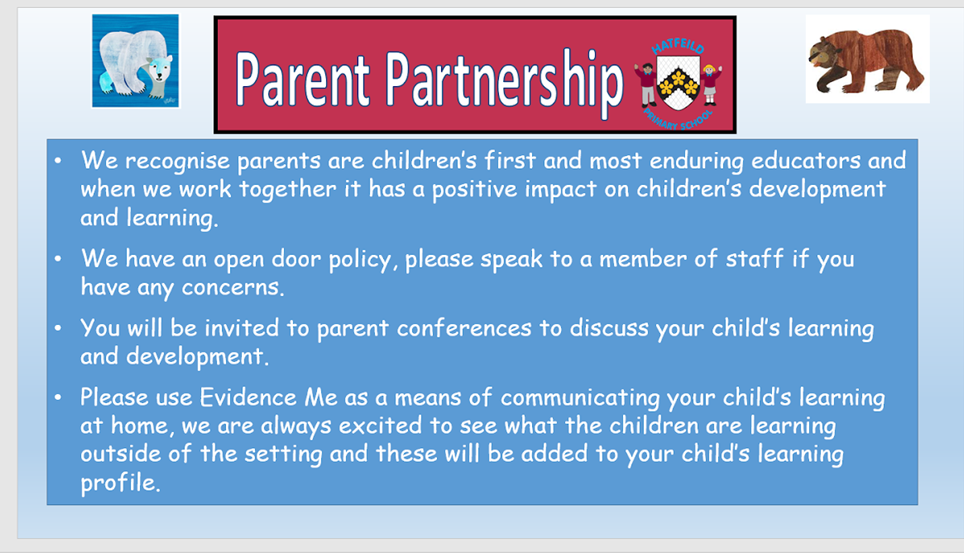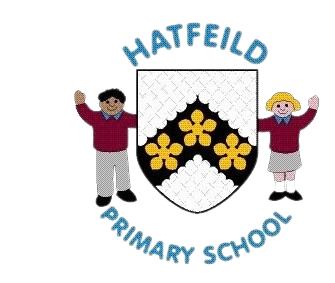Early Years Foundation Stage
Intent
At Hatfeild Primary school, we aim to create a caring, safe, supportive, and educationally challenging learning environment where all children make excellent progress. We are very proud of our Early Years. Our Nursery consists of a class teacher and a Teaching Assistant. Our Reception class consists of; two class teachers and two teaching assistants. There are 26 children in Nursery and 37 children in Reception as of Spring 2024. Many of our Nursery children will go on to be offered a place in Reception and follow through their learning journey at Hatfeild.
At the core of our ethos is:
-
We believe that each child is an individual and has a right to a high-quality early year’s education with a strong focus on communication.
-
We are caring and inclusive, and we cater for all children regardless of their needs. Children’s special educational needs and disabilities (SEND) are identified quickly, and we make necessary adaptations ensuring success for all.
-
Enabling children to take ownership and learn independently is of great importance in our setting.
-
We continuously plan opportunities and activities that will grab the interests of the children and set them up so they are able to make strong links in their learning (metacognition).
-
We believe that play is the highest form of exploration. “Play creates conditions for children to test the world, to make sense of it, to grow the skills needed to communicate, to negotiate and express their inner selves” (Greg Botrrill – Can I go and Play Now?
-
Developing a strong and respectful partnership with parents and carers is imperative. This sets the scene for children to thrive in the early years.
The National Curriculum for EYFS states:
‘Children are born ready, able and eager to learn. They actively reach out to interact with other people, and in the world around them. Development is not an automatic process, however. It depends on each unique child having opportunities to interact in positive relationships and enabling environments.’
‘Children learn and develop more from birth to five years old than at any other time in their lives. When we give every child the best start in their early years, we give them what they need today. We also set them up with every chance of success tomorrow.’ Development Matters September 2023.
Implementation
We are committed to being reflective practitioners who systematically observe and plan for children’s individual developmental needs. At Hatfeild we aim to open the door to lifelong learning by providing a happy, secure and inspiring early years learning environment, which ultimately builds the foundations for future education, skills and resilience for life. Our unit supports children to: develop confidence to ask questions, explore and investigate their world through first-hand experiences; and think creatively and imaginatively through the provision of open-ended practical resources.
Development Matters states:
The ways in which the child engages with other people and their environment – playing and exploring, active learning, and creating and thinking critically – underpin learning and development across all areas and support the child to remain an effective and motivated learner.
The prime areas begin to develop quickly in response to relationships and experiences, and run through and support learning in all other areas. The prime areas continue to be fundamental throughout the EYFS.
The specific areas include essential skills and knowledge. They grow out of the prime areas, and provide important contexts for learning.
What you will see:
In our Early Years, you will see children who are engaged in learning through a play-based curriculum. Play is the highest form of research. Our indoor and outdoor learning environments reflect the children’s interests and are carefully planned and resourced to support the children’s development.
You will see fine and gross motor activities to support the children’s development and to coordinate their whole body. We have large scale moving equipment in our outdoor area, such as: climbing equipment, stage, physical equipment for throwing, catching and balancing. Inside and outside, you will find ‘Finger gym’ activities to support the children to strengthen their hands in order to build their early writing development.
In all areas, we have reading and phonic opportunities to encourage children’s love for reading and recognising words in their environment. In the classroom we have a language-rich environment. We have a reading area that adapts to our topics, whether it is a reading forest, snow cave, fact detectives and many more. In our role play we give opportunities for imaginative play to develop their language acquisition. We have real photographs and the children often make labels for the environment. The displays that reflect the children’s work include their writing and speech. Every day we have story time to promote the love of reading and to develop their understanding of texts. In the outside environment, we have the mud kitchen where the children can read and follow instructions for recipes such as leaf soup or mud muffins. The builder’s café and the fairy garden allow children opportunities for reading stories and making up their own narratives.
Reading café:
Every Friday we hold a Reading Café. This is an opportunity for parents/carers/guardians to come and enjoy reading with all the children in the class. It is important that children see us as readers and develop a love for reading and talking about illustrations.
A large part of daily life at school is about making relationships and building your self-confidence. In our setting, we support children to become independent learners where they can self-negotiate and tackle challenges with confidence and resilience. Through circle-time and role play, we give children the tools they need to explore for themselves in their self-initiated play.
Training and Development:
Our staff are trained to teach the Read Write Inc phonics programme. We continuously provide our staff with up-to-date training through our phonics lead.
This year we have also been lucky enough to be part of the Boogie Mites which is a music-based programme to support phonological awareness. Music helps children gain phonic knowledge that will contribute to decoding regular words and reading them aloud accurately. To recognise rhymes, rhythms and patterns of words. To use expression in storytelling through work with intonation, tempo, dynamics, actions and facial expressions that go with music-making. There has been marked progress for our children who have English as an Additional Language. Through the songs, these children have gained access to new languages and have given them more confidence with their peers as they were able to join in equally with their peers. In our Nursery it has given our staff more understanding of the early stages of phonics and the importance of sound discrimination.
Our Reception staff have also taken part in Drawing Club training and are implementing this as part of our vocabulary and writing. Drawing Club is a true adventure and perfect for Reception. Based around the Golden Blend of picture books, tales and animations, it involves a short period of time together as a whole class followed by time with children exploring their ideas and creativity that can be adapted to what you believe is best.
Immerse children in the world of story and develop children’s creativity and imagination to show them that they are extraordinary.
Implement
If you were to walk into our Early Years at Hatfeild, you would see:
-
Children who are happy and ready to learn.
-
Children and adults learning through exploration and play.
-
A language and talking rich environment which provides children opportunities to learn new and exciting words.
-
Children who are rapidly acquiring new skills to ensure they have experienced a wide and deep understanding of the curriculum.
-
A nurturing and safe environment, which enables children to develop the confidence to speak.
-
We are sensitive practitioners who support children’s communication.
-
We ensure there are opportunities for children to embed the skills they have learnt during carpet time into their play during free flow.
We value our partnerships with parents, knowing this enables us to develop a holistic view of each individual child. This has been enriched by the use of ‘Parent Share’, an effective platform through which our observations in school and home can be shared with each other.

An example of skill progression within our EYFS curriculum:
 Stages of writing:
Stages of writing:

Examples of learning:
Priorities for 2024 – 2025:
-
Ensuring we provide high quality language interactions and opportunities to support all our children through the implementation of our Boogie Mites and Drawing Club training.
-
To ensure our outdoor learning environment provides high quality learning opportunities and interactions with the staff
-
Our early readers have the opportunity to develop as confident and fluent readers through the use of the Read Write Inc phonics scheme.
